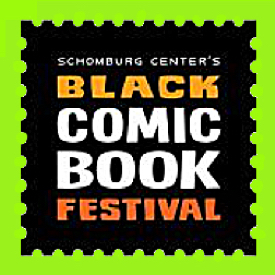Martha Thomases: Social Justice Warriors?
 This week, I want to write about something I didn’t do.
This week, I want to write about something I didn’t do.
It’s a good thing. Rally. Trust me.
Last Friday I read this item in The New York Times about a black comic book festival to be held on Saturday at the Schomburg Center in Harlem. Since I aspire to experience new things (and because, especially in winter, I have a tendency towards lethargy), I decided I would go.
The next morning, after I did my errands, and ascertaining that the predicted rain was not going to happen, I went online to find out which subway to take, and what stop to get off. Alas, the website informed me that the event was sold out. Since this was a good excuse to take my pants off, I didn’t try to go anyway.
According to everything I read, it was a huge success. There were loads of people, including lots of kids and other new readers, and everyone had a fabulous time.
More important (at least to me), African American comic book writers and artists got to talk directly to fans about the kinds of comics they wanted to make and the kinds of comics they wanted to read. They talked about social justice and equal opportunities and creating community and all the other stuff that mattered to them as artists and as citizens and as readers.
These are the kinds of conventions I’ve always liked. They are small enough so that, as Miss Manners would say, “The roof is your introduction.” Because this gathering had a theme, it’s natural that all concerned would happily indulge in conversations about that topic.
 I thought of this when I read this review of a new Valiant title, Faith. To quote from the lead, “Today’s comic book industry has problems. Not just editorial and creative problems but also problems from the pressures of Social Justice Warriors. These types of people make our lives miserable as comic fans. Always crying out for more diversity this and more diversity that. Most of the time you’ll discover these people don’t even read the comics they are clamoring for change to occur in. That’s always been the real pain in the ass for diversity in comics.”
I thought of this when I read this review of a new Valiant title, Faith. To quote from the lead, “Today’s comic book industry has problems. Not just editorial and creative problems but also problems from the pressures of Social Justice Warriors. These types of people make our lives miserable as comic fans. Always crying out for more diversity this and more diversity that. Most of the time you’ll discover these people don’t even read the comics they are clamoring for change to occur in. That’s always been the real pain in the ass for diversity in comics.”
I don’t know who these “Social Justice Warriors” are, nor does the reviewer cite anyone. Therefore, it is impossible to tell if they do not, in fact, buy the books for which they “clamor.” Are there not enough books aimed at the straight white cis male audience? Are there no media that will cater to his tastes? Perhaps he should go to the movies or watch television where the stories of his kind still predominate.
Back when Milestone Comics started, I was very excited to be peripherally involved, because it presented an opportunity for people outside the mainstream to tell their own stories, which I hadn’t read. Later, when I had the chance to sit in the audience for Michael Davis’ Black Panel at SDCC, I was impressed that the message wasn’t that DC or Marvel (or any publisher) owed aspiring African-American creators the right to work on their characters, but that they had their own stories to tell the way they wanted to tell them.
Maybe you don’t want to talk about African-American comic books with African-American comic book creators, or maybe you don’t want to read comics intended to tell those stories, That’s okay. Nobody is going to force you.
Hell, nobody needs you.
They sold out all the available space without you.











